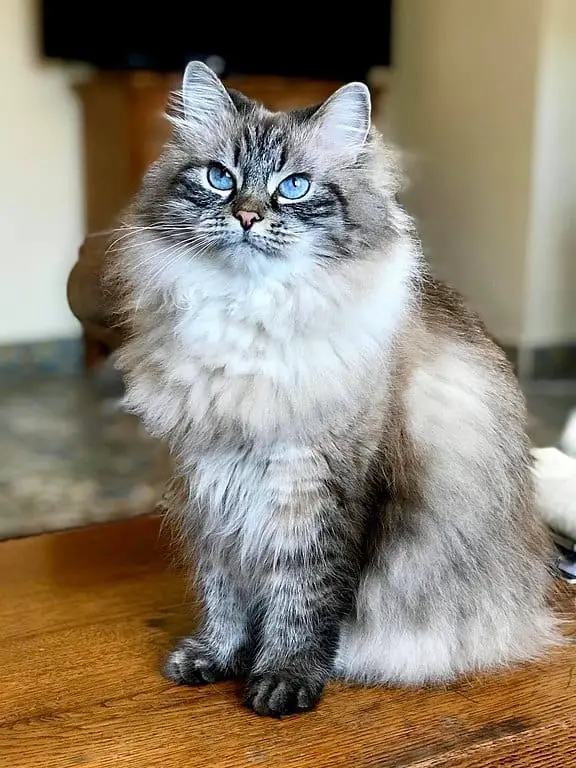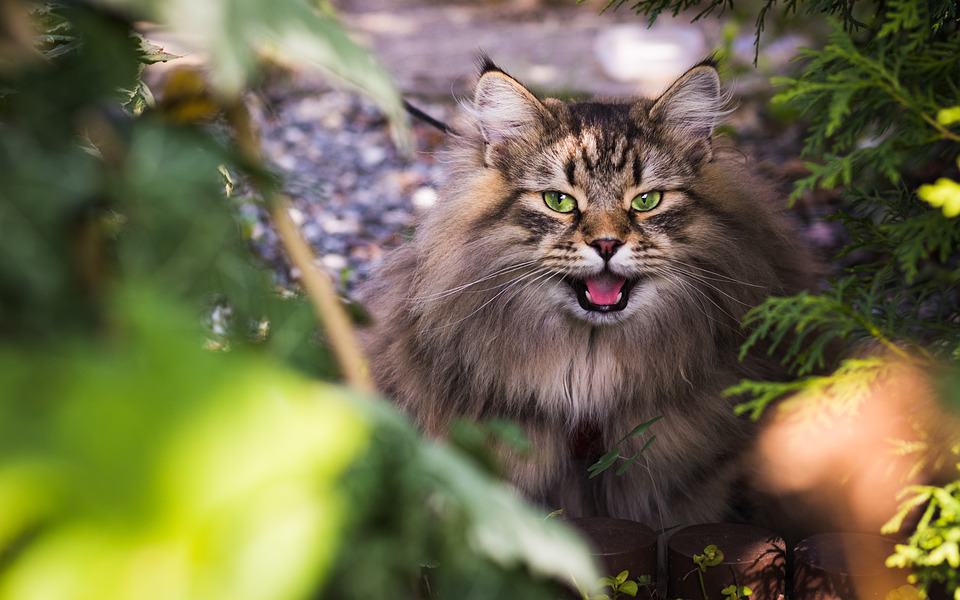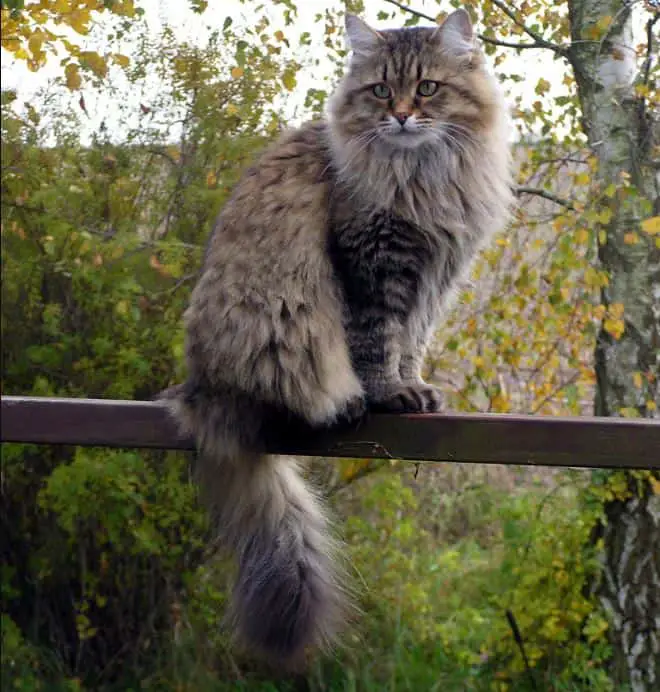When researching hypoallergenic cat breeds, you’ll find that the beautiful Siberian Cat will often be highly recommended. With a gorgeous coat, an athletic body, and a fluffy tail, it’s hard to not fall in love with this breed!
Also called the Siberian Forest Cat and closely related to the Norwegian Forest Cat, these beauties are an excellent choice for those looking for a “hypoallergenic” cat breed due to the fact that people often have less of a reaction to them. But, are Siberian cats truly hypoallergenic? Let’s find out.

What does hypoallergenic really mean?
With 10-30% of the human population affected by allergies, it’s quite possible that you or a family member will be one of those people.
Most of the time they are manageable with over-the-counter medicines and avoiding triggers, but sometimes they can be debilitating.
When you begin your search for hypoallergenic pets, you’re going to have hundreds of hits. But what exactly does the word mean? “Hypo” means less or under, so when combined with “allergenic”, the term means less likely to cause an allergic reaction.
This is the most important aspect to understand. Even if something is labeled as hypoallergenic, it does not mean that it won’t cause any reaction at all, just that it is less likely to.
Businesses and breeders sometimes try to use this term to trick consumers into buying their products. Nevertheless, it is well researched that some items or pets are indeed less likely to cause allergens and can be a great fit for a home that might otherwise be unable to have a pet.
Whenever the claim that a pet is “hypoallergenic” is made, be sure to do your research on your chosen animal companion to decide if they’ll be a good fit for your home.
Are Siberian Cats Hypoallergenic?

Originating in the forests of Siberia, the Siberian Cat is an ancient breed and recent research has connected them to all long-haired breeds. Extremely athletic cats with a three-layer coat, these guys are well-suited for the harsh temperature changes in the forests of Siberia.
Now, it seems a bit odd that a long-haired, fluffy cat would be on the hypoallergenic list, doesn’t it? After all, many people are under the impression that a cat’s fur is what triggers allergies.
However, this is not the case. Cat allergens are actually created within the cat’s saliva and skin glands and then are transferred to their surroundings by either grooming or shedding.
Since studies began on these cats in the 1990s, scientists have found that Siberians create less of the Fel d1 protein complex than most cat breeds. This is the most common protein that cats create through their saliva and skin glands and is responsible for allergic reactions. While scientists are unsure of why Siberians create less of this protein, it has led to an increase in popularity in the breed as they are less likely to cause reactions.
To sum it up: No pet is completely allergen-free. However, there are certain breeds that are more suited for homes of allergy sufferers due to the fact that these breeds are less likely to trigger an allergic reaction. The Siberian Cat is an excellent choice in this regard due to the fact that they produce less of the protein that’s primarily responsible for the allergic reactions that people have to cats.
Are colorpoint Siberians/Neva Masquerades hypoallergenic?
Neva Masquerades are Siberian cats with a colorpoint pattern. They’re not an officially recognized separate breed by most Cat Fancier organizations and are often lumped together with the Siberian. However, many people wonder if these cats have similarly low Fel D1 proteins to regular Siberians.
Luckily, there’s nothing to suggest that this is not the case and Neva Masquerades can typically be considered to be just as hypoallergenic as regular Siberian cats.
Figuring out if you’re allergic to Siberian Cats
If you have cat allergies and are considering buying a Siberian due to their hypoallergenic nature, it’s important that you do two things.
1. Get the cat tested
Many Siberian breeders are in the business of breeding these cats because of their hypoallergenic nature. As a result, most responsible breeders will offer tests for the kittens they sell.
They do this by taking a saliva sample and sending it to a lab to test it for Fel D1 protein levels. Remember, the protein that’s responsible for the allergic reaction? If the levels are low, people are less likely to have reactions to them.
2. Visit the kitten in person
In addition to tests, good breeders will often allow people who are allergic to visit their cattery to see how they respond to their potential new addition to the family.
Oftentimes, the best way to figure out how you’ll react to a kitten is by simply rubbing your face in its fur. If you don’t have a reaction, you can be pretty sure that this kitten will be a great fit for you.
If the cattery is too far away from you to do this you can also ask them to send you a hair sample.
Do Siberian Cats Shed?

Siberian cats do indeed shed. Their thick coat is built to withstand the cold of the Siberian winters, but in the spring, temperatures rise and they shed their winter coat to avoid overheating. As a result, Siberians will shed quite a bit.
Nevertheless, as we’ve discussed, the fur is not actually what’s responsible for cats making you sneeze. It’s the protein in their saliva that they rub into the fur when they’re grooming themselves.
Siberians create less of this troublesome protein. As such, the fact that they shed might mean that you’ll have to vacuum clean more, but it will not increase the likelihood of you being allergic to them.
Siberian Cat Personality
Siberian cats are among the friendliest and most energetic breeds out there. One thing that people often say about them is that they’re the dogs of the cat world. They can learn to play fetch and stay young longer than other breeds, taking up to 5 years to fully mature.
They’re highly playful and bring lots of love and joy to any household they inhabit.
Interestingly enough, these cats love water. Whereas most breeds absolutely despise getting wet, the Siberian will gladly play in the water. This is not only quite funny, but it’s also beneficial because it makes it much easier to bathe them, which can help reduce allergic reactions!
On the whole, the personality of the Siberian cat is devoted but not clingy. They can be independent if they need to but do not shy away from spending time with their owners. Furthermore, they can live with other pets and are great with children.
They also come in a wide variety of different colors and patterns, giving you plenty of options to choose from!
Other hypoallergenic cat breeds
If you live outside of Europe, finding a Siberian Cat will be tricky. It is very expensive to import the cat outside of Europe and those who do find a breeder will pay a hefty price. Siberian kittens can easily cost over $3000 if you buy them from a good breeder.
Luckily, there are other breeds of cats that are less likely to cause allergic reactions, such as:
- Sphynx
- Russian Blue
- Cornish Rex
- Devon Rex
- Siamese
- Javanese
- Oriental shorthair
- Burmese
- Laperm
Be sure to do your research on each cat and talk with other owners to discover their experience with these breeds. No one wants to bring home a new pet and then find out they cannot handle them and have to return them. As such, it’s always prudent to do plenty of research.
If you’ve set your heart on a Siberian Cat or any other breeds listed above, there are options for living with allergens in your home. HEPA air cleaners can help trap and remove allergens from the air.
A rigorous cleaning schedule along with keeping up with your pet’s grooming can also go a long way in allowing both owner and pet to enjoy each other.
Final words
The Siberian Cat is an excellent choice for those looking for a “hypoallergenic” pet. While they can still cause allergic reactions in some people, they are less likely to do so than other cat breeds.
By speaking with the breeder you plan to buy the kitten to figure out how you’ll react to it you can make an informed decision about whether this is the right cat breed for you. If you have severe allergies, make sure to visit the breeder and do an allergy test before buying.
Additionally, people who do have allergic reactions to this breed often have much milder symptoms than they have to other breeds. If you’re set in stone on getting a Siberian, even if you have slight allergies, some of the tips we’ve mentioned can help you live with them in harmony.
Siberians are extremely beautiful and affectionate cats that enjoy the companionship of other cats along with their human owners which makes them great additions to any household, the fact that they’re hypoallergenic is just the cherry on top!
- How Long Do American Eskimo Dogs Live? Important Factors and Care Tips - September 29, 2023
- Do American Bulldogs Need Grooming? Essential Tips and Care Guidelines - September 29, 2023
- Do Bengal Cats Enjoy Playing? Essential Tips for Keeping Them Active - September 29, 2023